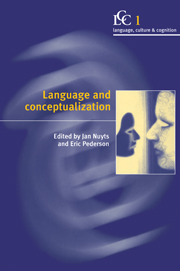Book contents
- Frontmatter
- Contents
- 1 Overview: on the relationship between language and conceptualization
- 2 From outer to inner space: linguistic categories and nonlinguistic thinking
- 3 Spatial operations in deixis, cognition, and culture: where to orient oneself in Belhare
- 4 Remote worlds: the conceptual representation of linguistic would
- 5 Role and individual interpretations of change predicates
- 6 Changing place in English and German: language-specific preferences in the conceptualization of spatial relations
- 7 Mapping conceptual representations into linguistic representations: the role of attention in grammar
- 8 Growth points cross-linguistically
- 9 On the modularity of sentence processing: semantical generality and the language of thought
- 10 The contextual basis of cognitive semantics
- 11 The cognitive foundations of pragmatic principles: implications for theories of linguistic and cognitive representation
- Subject index
- Index of names
9 - On the modularity of sentence processing: semantical generality and the language of thought
Published online by Cambridge University Press: 05 June 2012
- Frontmatter
- Contents
- 1 Overview: on the relationship between language and conceptualization
- 2 From outer to inner space: linguistic categories and nonlinguistic thinking
- 3 Spatial operations in deixis, cognition, and culture: where to orient oneself in Belhare
- 4 Remote worlds: the conceptual representation of linguistic would
- 5 Role and individual interpretations of change predicates
- 6 Changing place in English and German: language-specific preferences in the conceptualization of spatial relations
- 7 Mapping conceptual representations into linguistic representations: the role of attention in grammar
- 8 Growth points cross-linguistically
- 9 On the modularity of sentence processing: semantical generality and the language of thought
- 10 The contextual basis of cognitive semantics
- 11 The cognitive foundations of pragmatic principles: implications for theories of linguistic and cognitive representation
- Subject index
- Index of names
Summary
In memoriam Jacob Henry Atlas
Introduction
In section 1.1 of chapter 2 in this volume, Stephen Levinson reviews arguments that I and others have proffered in support of the conclusion that “[semantic representations] and [conceptual representations] are not only distinct kinds of representations they are also not isomorphic” (Levinson this volume). They are distinct kinds of representations, “contrary to assumptions in many diverse quarters, including not only Fodorians, Cognitive Linguists, and those of similar views, but also most branches of computational linguistics”. But the contrast that I defended was not one between types of representations; it was one between thoughts and English sentences, both ‘propositional’ or language-like in nature: thoughts that are true or false, and statements that are true or false. In the history of modern philosophy and psychology, from John Locke forward, philosophers have underemphasized the autonomy of the language faculty (Chomsky). My arguments were intended to redress the imbalance.
But I did not assume that thoughts were ‘representations’ in some computational sense. For those philosophers of mind and cognitive scientists who accept a version of a ‘computational theory of cognition’ (Cummins 1989) for mental states like belief, desire, etc. – or a Representational Theory of the Mind in general (Fodor 1975, among others) – the moral of my (Atlas 1975, 1977, 1978, 1979, 1989) argument for them was that many ‘sentences’ in Mentalese are not identical to, synonymous with, or translatable into any sentence in English.
- Type
- Chapter
- Information
- Language and Conceptualization , pp. 213 - 228Publisher: Cambridge University PressPrint publication year: 1997
- 15
- Cited by

